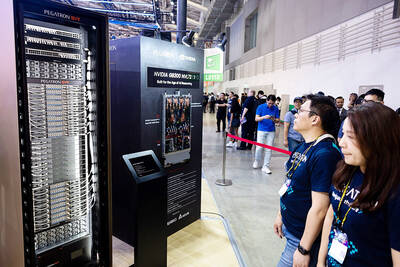Japanese manufacturing activity contracted this month for the first time in two-and-a-half years, as factories cut output amid shrinking domestic and export orders, a private business survey showed yesterday.
The survey also showed business confidence in Japan soured for the first time in more than six years, highlighting the growing toll that the US-China trade spat is inflicting on Asia’s export-reliant economies and global manufacturing.
The Flash Markit/Nikkei Japan Manufacturing Purchasing Managers’ Index (PMI) this month fell to a seasonally adjusted 48.5 from a final 50.3 in January.
The index fell below the 50-point threshold that separates contraction from expansion for the first time since August 2016.
The pessimistic turn in business sentiment “comes as no surprise given the international headwinds Japanese manufacturers are facing, such as a China slowdown and the global trade cycle losing further steam,” said Joe Hayes, an economist at IHS Markit, which compiles the survey.
“Unless service sector activity can recover from January’s decline, the chance of Japan entering a recession in 2019 looks set to rise,” Hayes said.
The output component of the flash PMI index fell to a preliminary 47 from a final 54.4 in January to show the fastest contraction since May 2016.
Indicators of future activity were equally grim.
Total new orders — domestic and foreign — pointed to a sharper decline in demand than the previous month. Although export orders contracted at a slightly slower pace, it is unlikely to ease doubts about the outlook for overseas demand.
Companies also reduced their purchases of raw materials and other inputs for the second month running.
The PMI survey comes one day after government data showed Japan’s exports fell the most in more than two years in January as China-bound shipments tumbled.
Global trade has slowed over the past year as Washington and Beijing ramped up tariffs on each others’ goods, disrupting supply chains worldwide. At the same time, economic activity has been weakening noticeably in China and Europe.
Japan could face further weakness if the US and China do not quickly resolve their differences over trade, some economists say.
Negotiators from both sides are racing to beat a Friday next week deadline for a deal, although US President Donald Trump has said that could be extended if an agreement appeared close.
Japan’s economy bounced back in the fourth quarter last year as business and consumer spending recovered from the effect of natural disasters, but trade frictions and a proposed sales tax hike are expected to hinder growth this year.

AI TALENT: No financial details were released about the deal, in which top Groq executives, including its CEO, would join Nvidia to help advance the technology Nvidia Corp has agreed to a licensing deal with artificial intelligence (AI) start-up Groq, furthering its investments in companies connected to the AI boom and gaining the right to add a new type of technology to its products. The world’s largest publicly traded company has paid for the right to use Groq’s technology and is to integrate its chip design into future products. Some of the start-up’s executives are leaving to join Nvidia to help with that effort, the companies said. Groq would continue as an independent company with a new chief executive, it said on Wednesday in a post on its Web

RESPONSE: The Japanese Ministry of Finance might have to intervene in the currency markets should the yen keep weakening toward the 160 level against the US dollar Japan’s chief currency official yesterday sent a warning on recent foreign exchange moves, after the yen weakened against the US dollar following Friday last week’s Bank of Japan (BOJ) decision. “We’re seeing one-directional, sudden moves especially after last week’s monetary policy meeting, so I’m deeply concerned,” Japanese Vice Finance Minister for International Affairs Atsushi Mimura told reporters. “We’d like to take appropriate responses against excessive moves.” The central bank on Friday raised its benchmark interest rate to the highest in 30 years, but Bank of Japan Governor Kazuo Ueda chose to keep his options open rather than bolster the yen,

Even as the US is embarked on a bitter rivalry with China over the deployment of artificial intelligence (AI), Chinese technology is quietly making inroads into the US market. Despite considerable geopolitical tensions, Chinese open-source AI models are winning over a growing number of programmers and companies in the US. These are different from the closed generative AI models that have become household names — ChatGPT-maker OpenAI or Google’s Gemini — whose inner workings are fiercely protected. In contrast, “open” models offered by many Chinese rivals, from Alibaba (阿里巴巴) to DeepSeek (深度求索), allow programmers to customize parts of the software to suit their

Global server shipments are expected to surge to 15 million units next year, from 4 million units this year, with artificial intelligence (AI) servers accounting for about 30 percent, driven by massive capital spending by major cloud service providers, the Market Intelligence and Consulting Institute (MIC) said on Thursday last week. Major cloud service providers — including Google’s parent company Alphabet Inc, Microsoft Corp, Amazon.com Inc and Meta Platforms Inc — are projected to budget US$450 million for capital expenditure next year, up from US$400 million this year, MIC ICT [information and communications technology] Industry Research Center director Edward Lin